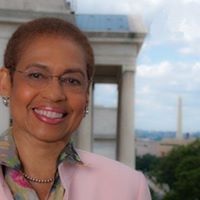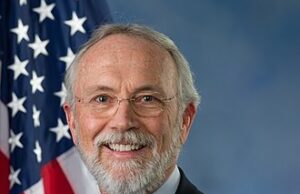On the 44th Anniversary of the Home Rule Act, Norton to Go to House Floor to Recall Its Bipartisan Origin and Call Out Members Who Attack D.C. Home Rule, Tomorrow
WASHINGTON, D.C. – (RealEstateRama) — Congresswoman Eleanor Holmes Norton (D-DC) will commemorate the 44th anniversary of the enactment of the District of Columbia Home Rule Act this month, beginning with a floor speech tomorrow, Tuesday, December 11, 2017, at 10:00 a.m., and another speech planned for next week. Norton will not only review the history of the Home Rule Act, which was signed into law by Republican President Richard Nixon on December 24, 1973, she will use the occasion to expose the repeated attempts by Republican Members, who violate their local control principles, to overturn local D.C. laws. Norton has defeated all new attempts this Congress to overturn D.C. laws.

“My Republicans colleagues should read and respect their own history to understand that it was a Republican president, Richard Nixon, who signed the Home Rule Act,” Norton said. “After nearly 100 years of struggle by D.C. residents, there was strong bipartisan support for giving D.C. a local government and a Member of Congress. President Nixon carried out the foremost Republican principle that local residents should always be served by a democratically-elected local government when he signed the Home Rule Act into law, eliminating the prior system of unelected commissioners, who had governed the District. Yet, 44 years after the Home Rule Act became law, we still must fight annual attempts by Members of Congress to undermine the Home Rule Act by trying to overturn local D.C. laws. These Members have shown they have no interest in the daily activities of the District, which has had a balanced budget and surplus for years, but only become involved when they disagree with policies residents have asked the D.C. Council and the mayor to enact. As we celebrate the 44th Anniversary of the Home Rule Act, I also will be reminding my colleagues that D.C. residents rank number one per capita in taxes paid to support the federal government and of the local control intent of the historic legislation, passed with widespread bipartisan support.”
In his signing statement on the Home Rule Act, Nixon wrote, “One of the major goals of this Administration is to place responsibility for local functions under local control and to provide local governments with the authority and resources they need to serve their communities effectively. The measure I sign today represents a significant step in achieving this goal in the city of Washington. It will give the people of the District of Columbia the right to elect their own city officials and to govern themselves in local affairs. As the Nation approaches the 200th anniversary of its founding, it is particularly appropriate to assure those persons who live in our Capital City rights and privileges which have long been enjoyed by most of their countrymen. But the measure I sign today does more than create machinery for the election of local officials. It also broadens and strengthens the structure of the city government to enable it to deal more effectively with its responsibilities.”
Below is a full list of the anti-home-rule attacks so far in the 115th Congress. Norton expects to be able to defeat most of them.
Guns
- Senator Marco Rubio (R-FL) and Representative Tom Garrett (R-VA) introduced the Second Amendment Enforcement Act (S. 162/H.R. 1537), which would eliminate D.C.’s gun safety laws. The bill would eliminate the District’s ban on assault weapons, large capacity magazines, and its registration requirements, and prohibit D.C. from passing gun laws in the future.
- Representative Thomas Massie (R-KY) introduced the D.C. Personal Protection Reciprocity Act (H.R. 2909), which would require D.C. to recognize out-of-state concealed carry permits.
Education
- Senator Ted Cruz (R-TX) and Representative Mark Meadows (R-NC) introduced the Educational Freedom Accounts Act (S. 2163/H.R. 4576), which would require D.C. to use local funds to pay for private schools and other educational expenses for any student.
Medical Aid in Dying
- Representative Brad Wenstrup (R-OH) and Senator James Lankford (R-OK) introduced disapproval resolutions (H.J.Res. 27/S.J.Res. 4) on D.C.’s Death with Dignity Act (DWDA). The House Oversight and Government Reform Committee passed H.J.Res. 27.
- President Trump’s FY 18 budget prohibits D.C. from using its local funds to carry out the DWDA in FY 18.
- The House-passed FY 18 D.C. Appropriations bill (H.R. 3354) repeals the DWDA and prohibits D.C. from passing similar legislation in FY 18 (Representative Andy Harris (R-MD) offered the provision as an amendment at the markup.)
Budget Autonomy
- The House-passed FY 18 D.C. Appropriations bill (H.R. 3354) repeals the Local Budget Autonomy Act of 2012 and prohibits D.C. from passing similar legislation in the future.
Non-Discrimination
- The House-passed FY 18 D.C. Appropriations bill (H.R. 3354) prohibits D.C. from spending its local funds to carry out the Reproductive Health Non-Discrimination Act (Representative Gary Palmer (R-AL) offered the provision as an amendment on the House floor).
Wipes Labeling
- Representative Harris offered and withdrew an amendment at the markup of the House’s FY 18 D.C. Appropriations bill (H.R. 3280) to prohibit D.C. from spending its local funds to carry out the Nonwoven Disposable Products Act in FY 18.
Marijuana
- The enacted FY 17 omnibus appropriations bill (P.L. 115-31) prohibits D.C. from spending its local funds on marijuana commercialization in FY 2017.
- President Trump’s budget prohibits D.C. from spending its local funds on marijuana commercialization in FY 18.
- The House-passed FY 18 D.C. Appropriations bill (H.R. 3354) prohibits D.C. from spending its local funds on marijuana commercialization in FY 18.
Abortion
- Representative Chris Smith (R-NJ) and Senator Roger Wicker (R-MS) introduced the No Taxpayer Funding for Abortion and Abortion Insurance Full Disclosure Act of 2017 (H.R. 7/S.184), which would, among other things, permanently prohibit the D.C. government from spending its local funds on abortion services for low-income women, prohibit D.C. government employees from providing abortions, prohibit abortions in D.C. government facilities, and define the D.C. government as part of the federal government for purposes of abortion. The House passed H.R. 7.
- The enacted fiscal year 2017 omnibus spending bill (P.L. 115-31) prohibits D.C. from spending its local funds on abortions for low-income women in FY 17.
- President Trump’s fiscal year 2018 budget prohibits D.C. from spending its local funds on abortions for low-income women in FY 18.
- The House-passed FY 18 D.C. Appropriations bill (H.R. 3354) prohibits D.C. from spending its local funds on abortions for low-income women in FY 18.
Labor
- Representative Steve King (R-IA) introduced the Freedom From Union Violence Act of 2017 (H.R. 4422), which would, among other things, make it a federal crime to commit violence within the District in connection with a legitimate labor dispute.
###













